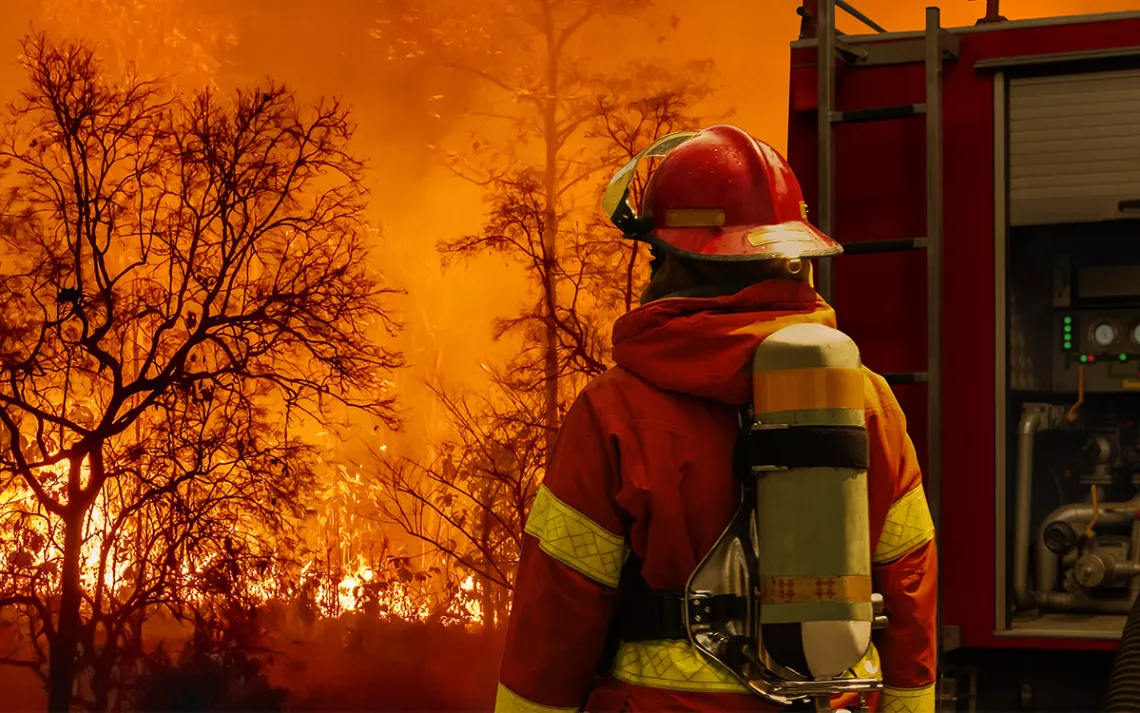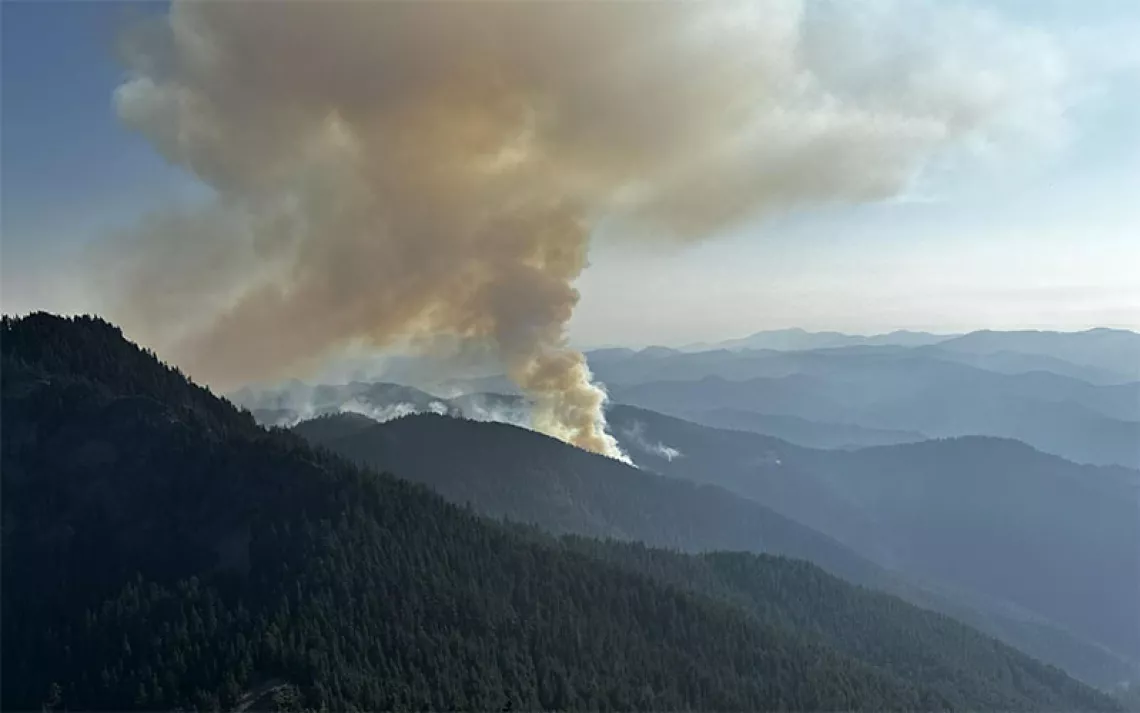Feet to the Fire
A pay cut is looming for federal firefighters

Photo byToa55 | iStock
In the spring of 2022, when smoke-jumper Ben Elkind broke his hip parachuting out of an airplane to train for wildfire season, a scan revealed a shadow in his throat: thyroid cancer. Elkind’s biggest concern when he heard the news wasn’t his health. It was money.
Immobilized in a hospital bed, he wondered how he and his wife, a health-care worker, would feed their children, ages one and four. As it turned out, a well-timed raise fed them. The Bipartisan Infrastructure Law greenlit by Congress a few months earlier contained a critical boost for federal wildland firefighters working in areas where it was hard to recruit or retain firefighters.
The money was distributed as a “retention bonus” instead of being added to base pay, which meant that it didn’t increase firefighters’ retirement contributions, or count toward overtime (some of that was received later via corrections through the Fair Labor Standards Act). It also didn’t reach everyone it was supposed to—federal agencies reported more than 400 outstanding cases of delayed payments. In February, Congressman Joe Neguse (D-Colo.) and colleagues sent a letter “imploring” federal agencies to properly implement firefighter pay, requesting an explanation from the US Forest Service and the Department of the Interior.
But Elkind did get paid, and the extra money helped his family survive while he worked light duty during cancer treatment. It also helped thousands of other wildland firefighters struggling to justify staying in an increasingly difficult job at wages that average $15-$17 an hour (about $28,000 to $35,000 a year before taxes).
This year, as a healthy Elkind prepares to return to smoke jumping, that pay bump is set to expire. If Congress fails to pass another one before September 2023, wildland firefighters face a $20,000 pay cut—in the heart of the Western fire season.
This comes in the context of a long-running failure to support firefighters, at a time when hiring and retaining them is harder than ever. Federal agencies that hire firefighters are already grappling with dangerously low staffing, as burned-out employees leave in droves for jobs in state and municipal firefighting, where they can earn as much as 50 percent more. “For many firefighters, the increased pay meant surviving winter for the first time, or finally being able to maintain a savings,” said Tom Dillon, a federal firefighter in Colorado. “If you yank that away, you’re gonna see a significant wave of departure.”
In order for firefighters to get a permanent raise, federal agencies need to propose their new pay structure and its total cost in a presidential budget request. Once Congress sees it, appropriators will decide if it is a sound plan. The agencies’ budgets will be approved—or not.
That process is already underway. The Forest Service and Department of the Interior submitted their budget requests in early March. But they were missing a piece. Since federal salaries are set in law, a budget proposal that would change federal firefighter pay needs to include a legislative proposal to change the underlying law.
The late March legislative proposal, coupled with the USFS’s budget justification, offers a picture of the agencies’ plans. At first blush, the proposed budget contains longed-for, hard-won victories. It offers increased base pay, portal-to-portal pay (partial compensation for all the hours spent away from home while traveling to/from and sleeping on a fire assignment), and funding to hire 970 additional firefighters. It includes funds for housing facility improvements and $10 million per agency to bolster mental health services.
Yet the salary numbers in these documents raise red flags about the permanent pay plan. The justification says the new pay scale will “raise base pay for firefighters on a sliding scale at all grades. For example, entry-level firefighters at grade GS-3 will receive a pay increase of 36 percent, and our most senior firefighters, at grade GS-15, will receive an increase of 1.5 percent.” The proposal’s salary table confirms this: Firefighters at GS-5 will receive a 30 percent increase; those at GS-7, 24 percent, and so on.
It is safe math to conclude that under this plan, federal firefighters will make less than they did under the Bipartisan Infrastructure Law. The law authorized an increase of $20,000 or 50 percent of base pay, whichever was less. A GS-3 who earned $15 an hour now earns $22.50 hourly under the infrastructure law increase—about $46,000. If the 2024 budget proposal were approved as is, the same GS-3 would see their pay decline to $20.40 an hour—about $42,000 (though most GS-3 wildland firefighters work seasonally, making their base salary closer to $21,000). The more experienced the firefighter, the larger the pay cut.
That lower base pay discourages firefighters from taking projects close to home that are less likely to result in overtime and do not earn hazard pay, like prescribed burning. It perpetuates dependence on overtime, hazard pay, and portal-to-portal (a.k.a. travel time) to earn a livable wage. These are the very problems that have eroded work-life balance and left many firefighters burned out and traumatized.
In a March 22 budget hearing with the Senate Appropriations Committee, Forest Service chief Randy Moore said, “We looked at about a $20,000 bump in pay that stemmed the tide of our employees leaving.… If that is permanent, which is proposed in the president’s FY24 budget, we think that that’s going to be a huge help.”
Unfortunately, the numbers in the legislative proposal don’t align with that hopefulness.
That means there are two paths by which federal firefighters could see a pay cut this year. If Congress fails to approve the budget by September 30 (the end of the fiscal year), firefighter pay will revert to what it was before the infrastructure law. If legislators approve the proposed 2024 budget without corrections to the pay tables, firefighters may receive a “permanent raise”—but one that is still a decrease from what they currently earn.
That comes with a risk—one that will be borne not only by firefighters but by all of us.
Brian Gold, a federal wildland firefighter in Colorado, said his employees will be unable to afford local housing without the income supplement provided by the infrastructure law. He fears that the new hires who came on in recent years won’t stay if their pay suddenly drops. “The federal government risks losing critical parts of its workforce,” Gold said. “That hurts those who leave, and those who stay.”
 The Magazine of The Sierra Club
The Magazine of The Sierra Club



